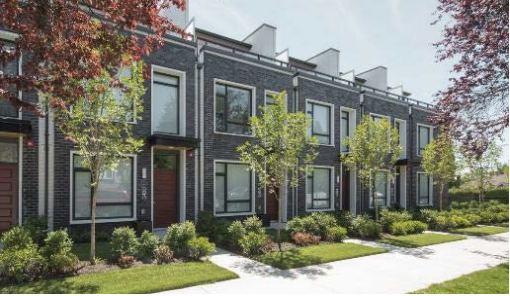
Dec 10, 2022: ABC slows Boyle’s motion to increase supportive, non-profit and co-op housing in all neighbourhoods
How do you say no without actually saying no?
The ABC supermajority on Council did so by taking their collective foot off the gas when it came to Cllr. Christine Boyle’s motion to accelerate the supply of non-profit, social, and co-op housing across Vancouver. At a Council meeting last month, Cllr. Boyle announced she was bringing back a revised version of her original motion that failed last May, to allow the above type of housing for up to 12-storeys in every Vancouver neighbourhood without the need for public hearings. This Wednesday her motion ran into the new power of the ABC party; soft power to be sure, but power nonetheless.
Carrying the ABC standard was Cllr. Mike Klassen, who submitted a lengthy, carefully worded amendment to Cllr. Boyle’s motion, asking for more recommendations from staff, deeper analysis on certain items, and — seemingly most frustrating to Councillors Boyle, Adriane Carr, and Pete Fry — all without a deadline. The expectation is that ABC will craft its own plan that aligns with the Vancouver Plan, which the party supports.
More than 50 people spoke in support of the plan, the majority of whom work in community and housing services.
The final vote passed unanimously. Councillors Carr, Fry, and Boyle voted against the initial amendment, clearly dissatisfied with the changes. Cllr. Pete Fry said Klassen’s changes would add delays for people in urgent need of housing. And because there is no deadline, the final amendment will “shuffle the work into Nowheresville.” Fry went so far as to ask the chair to rule the motion “frivolous” (out of order), but the chair ruled that it was not.
Cllr. Fry seemed particularly disheartened to hear William Azaroff, CEO of Brightside Community Services, talk about the frustrations he endured while building a project on French Street in Marpole. Azaroff planned to build a six-storey building, which the neighbourhood zoning permitted, and assumed the project could go directly to adevelopment permit. However, because the property was located on a hill, one side of the building was slightly higher than allowed by the existing zoning. It forced Azaroff to go through a public hearing and other City Hall red tape that added delays and an extra $4 million to the project.
At the end of the meeting, Boyle, who was on the edge of tears at times, thanked her fellow Councillors for working towards the same cause, but said Klassen’s changes further delays the urgent need to build for those living in insecure housing. She said the city needs to remove “every barrier it can” to people of all incomes to live in every neighbourhood. Many, she said, continue to live “one paycheque away from being evicted,” and the City should be standing up for them by enabling more low-cost housing.
ABC’S election promises on non-market social housing:
The following promises were found on the ABC Party’s website during the last election campaign. (Thanks to Brian Palmquist and CityHallWatch for saving and sharing the page.)
An ABC Majority will:
- Shift the City’s social and supportive housing strategy to focus on the delivery of quality, livable housing units, instead of the existing quantity-first approach, and ensure that a robust, appropriate continuum of care is enshrined in every project;
- Increase the City of Vancouver’s social and supportive housing investments in line with the consumer price index (CPI) every year;
- Double the number of co-operative (co-op) housing units in Vancouver within the next four years;
- Pilot housing for youth and youth ageing out of care in partnership with BC Housing
- Pilot a culturally appropriate, Indigenous-led supportive housing and wellness centre project in partnership with Indigenous peoples;
- Pre-identify locations in the city where density bonuses can be given to developers to accommodate the construction of additional non-market housing;
- Champion the role of non-profits in the delivery of housing and strengthen protections and supports for Vancouver’s existing market and non-market housing rental stock;
- Develop an overarching 20-year social and supportive housing plan for the City in partnership with BC Housing and other housing partners within two years;
- Reopen and then update the DTES Area Plan in partnership with community members, BC Housing, First Nations, and service providers;
- Encourage the construction of community-directed, culturally appropriate housing for seniors and develop concrete strategies for ageing in place;
- Collaborate with providers to deliver additional housing units for those living with developmental disabilities; and
- Negotiate with the Federal and Provincial governments to remove GST, PST, and other development-and-construction-impacting taxes, like the property transfer tax, for purpose-built rental housing, social housing, and supportive housing.
Another motion that passed unanimously on Wednesday was Cllr. Klassen’s “Reviewing Vancouver’s Age-Friendly Action Plan and Aligning with the World Health Organization’s (WHO)’s Age-Friendly Cities Framework.”
Klassen told Council that Vancouver faces twin existential threats: the worsening environment and the ageing population. Klassen said the City must continue to support seniors in all policies, just as the Vancouver Plan supports Indigenous populations.
Council agreed to direct staff to prepare a report and presentation on the City’s Age-Friendly Action Plan on or before the end of Q1 of 2023. The report should include information on the Plan’s current status, accomplishments to date, challenges, and emerging issues, in consultation with the City’s Seniors’ Advisory Committee and other relevant stakeholders. In addition, Council directed staff to include specific information in the report relating to the potential to align with and/or adopt the WHO’s Age-Friendly Cities framework and any other relevant and/or emerging global standards and best practices.
Photo above courtesy of the City of Vancouver.



No Comments